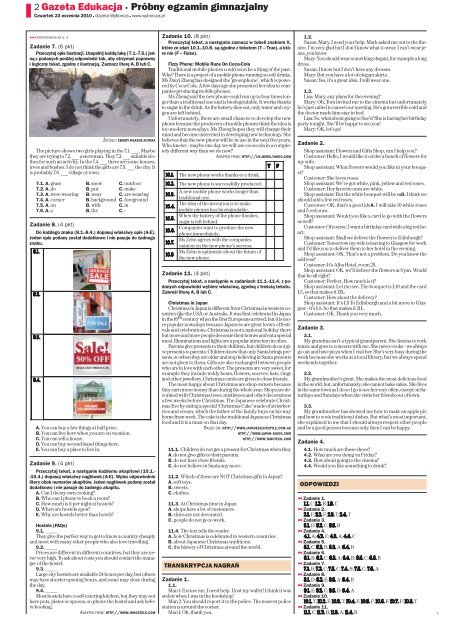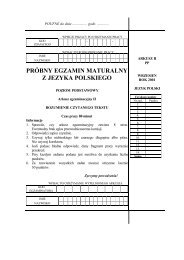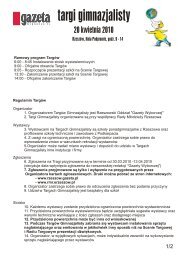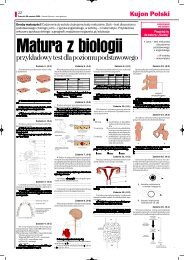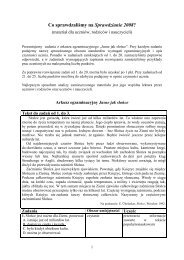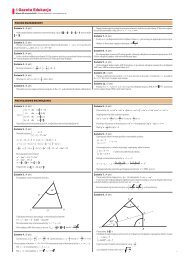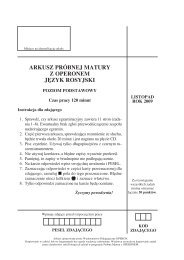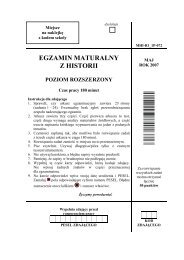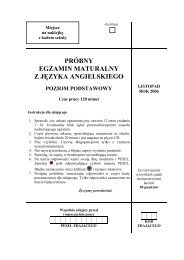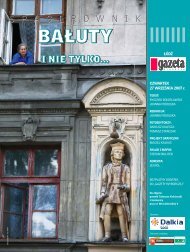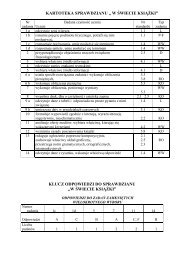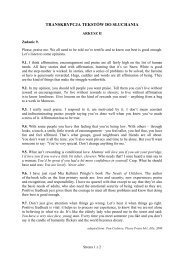Egzamin gimnazjalny Egzamin gimnazjalny - Gazeta.pl
Egzamin gimnazjalny Egzamin gimnazjalny - Gazeta.pl
Egzamin gimnazjalny Egzamin gimnazjalny - Gazeta.pl
Create successful ePaper yourself
Turn your PDF publications into a flip-book with our unique Google optimized e-Paper software.
2 <strong>Gazeta</strong> Edukacja 1 Próbny egzamin <strong>gimnazjalny</strong><br />
Czwartek 23 września 2010 + <strong>Gazeta</strong> Wyborcza + www.wyborcza.<strong>pl</strong><br />
uuuDokończenie ze s. 1<br />
Zadanie 7. (6 pkt)<br />
Przeczytaj opis ilustracji. Uzupełnij każdą lukę (7.1.-7.6.) jedną<br />
z podanych poniżej odpowiedzi tak, aby otrzymać poprawny<br />
i logiczny tekst, zgodny z ilustracją. Zaznacz literę A, B lub C.<br />
ŹRÓDŁO: ZBIORY WŁASNE AUTORA<br />
The picture shows two girls <strong>pl</strong>aying in the 7.1. ____. Maybe<br />
they are trying to 7.2. ____ a snowman. They 7.3. ____ suitable clothes<br />
for such an activity. In the 7.4. ____ there are some houses,<br />
trees and bushes. I do not think the girls are 7.5. ____ the city. It<br />
is probably 7.6. ____ village or town.<br />
7.1. A. grass B. snow C. outdoor<br />
7.2. A. do B. put C. make<br />
7.3. A. were wearing B. wear C. are wearing<br />
7.4. A. corner B. background C. foreground<br />
7.5. A. on B. with C. in<br />
7.6. A. a B. the C. -<br />
Zadanie 8. (4 pkt)<br />
Do każdego znaku (8.1.-8.4.) dopasuj właściwy opis (A-E).<br />
Jeden opis podany został dodatkowo i nie pasuje do żadnego<br />
znaku.<br />
8.1.<br />
8.2.<br />
8.3.<br />
8.4.<br />
A. You can buy a few things at half price.<br />
B. You can live here when you are on vacation.<br />
C. You can sell a house.<br />
D. You can buy second-hand things here.<br />
E. You can buy a <strong>pl</strong>ace to live in.<br />
Zadanie 9. (4 pkt)<br />
Przeczytaj tekst, a następnie każdemu akapitowi (10.1.-<br />
-10.4.) dopasuj właściwy nagłówek (A-E). Wpisz odpowiednie<br />
litery obok numerów akapitów. Jeden nagłówek podany został<br />
dodatkowo i nie pasuje do żadnego akapitu.<br />
A. Can I do my own cooking?<br />
B. Who can I phone to book a room?<br />
C. How much is it per night at hostels?<br />
D. When are hostels open?<br />
E. Why are hostels better than hotels?<br />
Hostels (FAQs)<br />
9.1. _____<br />
They give the perfect way to get to know a country chea<strong>pl</strong>y<br />
and meet with many other peo<strong>pl</strong>e who also love travelling.<br />
9.2. _____<br />
Prices are different in different countries, but they are never<br />
very high. To ask about costs you should contact the manager<br />
of the hostel.<br />
9.3. _____<br />
Large city hostels are available 24 hours per day, but others<br />
may have shorter opening hours, and some may close during<br />
the day.<br />
9.4. _____<br />
Most hostels have a self-catering kitchen, but they may not<br />
have pots, <strong>pl</strong>ates or spoons, so phone the hostel and ask before<br />
booking.<br />
ADAPTED FROM: HTTP://WWW.HIHOSTELS.COM<br />
Zadanie 10. (8 pkt)<br />
Przeczytaj tekst, a następnie zaznacz w tabeli znakiem X,<br />
które ze zdań 10.1.-10.8. są zgodne z tekstem (T – True), a które<br />
nie (F – False).<br />
Fizzy Phone: Mobile Runs On Coca-Cola<br />
Traditional mobile phones could soon be a thing of the past.<br />
Why? There is a project of a mobile phone running on soft drinks.<br />
Ms Daizi Zheng has designed the ’greenphone’, which is powered<br />
by Coca-Cola. A few days ago she presented her idea to companies<br />
producing mobile phones.<br />
Ms Zheng said the new phone could run up to four times longer<br />
than a traditional one and is biodegradable. It works thanks<br />
to sugar in the drink. As the battery dies out, only water and oxygen<br />
are left behind.<br />
Unfortunately, there are small chances to develop the new<br />
phone because the producers of mobile phones think the idea is<br />
too modern nowadays. Ms Zheng hopes they will change their<br />
mind and become interested in developing new technology. She<br />
believes that the new phone will be in use in the next five years.<br />
Who knows – maybe one day we will use coca-cola in a com<strong>pl</strong>etely<br />
different way than we do now?<br />
ADAPTED FROM: HTTP://UK.NEWS.YAHOO.COM<br />
10.1. The new phone works thanks to a drink.<br />
10.2. The new phone is successfully produced.<br />
A new mobile phone works longer than<br />
10.3.<br />
traditional one.<br />
The idea of the invention is to make<br />
10.4.<br />
mobile phones less biodegradable.<br />
When the battery of the phone finishes,<br />
10.5.<br />
sugar is left behind.<br />
Companies want to produce the new<br />
10.6.<br />
phone immediately.<br />
Ms Zehn agrees with the companies<br />
10.7.<br />
opinion on the new phone’s success.<br />
Ms Zehn is optimistic about the future of<br />
10.8<br />
the new phone.<br />
Zadanie 11. (4 pkt)<br />
Przeczytaj tekst, a następnie w zadaniach 11.1.-11.4. z podanych<br />
odpowiedzi wybierz właściwą, zgodną z treścią tekstu.<br />
Zakreśl literę A, B lub C.<br />
Christmas in Japan<br />
Christmas in Japan is different from Christmas in western countries<br />
like the USA or Australia. It was first celebrated in Japan<br />
in the 16 th century when the first Europeans arrived, but it is more<br />
popular nowadays because Japanese are great lovers of festivals<br />
and celebrations. Christmas is not a national holiday there<br />
but more and more peo<strong>pl</strong>e decorate their homes and eat a special<br />
meal. Illuminations and lights are a popular attraction in cities.<br />
Parents give presents to their children, but children do not give<br />
presents to parents. Children know that only Santa brings presents,<br />
so when they are older and stop believing in Santa presents<br />
are not given to them. Gifts are also exchanged between peo<strong>pl</strong>e<br />
who are in love with each other. The presents are very sweet, for<br />
exam<strong>pl</strong>e they include teddy bears, flowers, scarves, hats, rings<br />
and other jewellery. Christmas cards are given to close friends.<br />
The most happy about Christmas are shop owners because<br />
they earn more money than during the whole year. Shops are decorated<br />
with Christmas trees, mistletoes and other decorations<br />
a few weeks before Christmas. The Japanese celebrate Christmas<br />
Eve by eating a special ’Christmas Cake’ made of strawberries<br />
and cream, which the father of the family buys on his way<br />
home from work. The cake is the traditional Japanese Christmas<br />
food and it is a must on that day.<br />
BASED ON: HTTP://WWW.JAPANESELIFESTYLE.COM.AU<br />
HTTP://WWW.JAPAN-GUIDE.COM<br />
HTTP://WWW.TANUTECH.COM<br />
11.1. Children do not get a present for Christmas when they<br />
A. do not give gifts to their parents.<br />
B. do not have close friends.<br />
C. do not believe in Santa any more.<br />
11.2. Which of these are NOT Christmas gifts in Japan?<br />
A. soft toys.<br />
B. sweets.<br />
C. clothes.<br />
11.3. At Christmas time in Japan<br />
A. shops have a lot of customers.<br />
B. cities are not decorated.<br />
C. peo<strong>pl</strong>e do not go to work.<br />
11.4. The text tells the reader<br />
A. how Christmas is celebrated in western countries.<br />
B. about Japanese Christmas traditions.<br />
C. the history of Christmas around the world.<br />
TRANSKRYPCJA NAGRAŃ<br />
T F<br />
Zadanie 1.<br />
1.1.<br />
Man 1: Excuse me, I need help. I lost my wallet! I think it was<br />
stolen when I was in the bookshop!<br />
Man 2: You should report it to the police. The nearest police<br />
station is around the corner.<br />
Man 1: Oh, thank you.<br />
1.2.<br />
Susan: Mary, I need your help. Mark asked me out to the theatre.<br />
I’m very glad but I don’t know what to wear. I can’t wear jeans,<br />
you know.<br />
Mary: You should wear something elegant, for exam<strong>pl</strong>e a long<br />
dress.<br />
Susan: I know but I don’t have any dresses.<br />
Mary: But you have a lot of elegant skirts.<br />
Susan: Yes, it’s a great idea. I will wear one.<br />
1.3.<br />
Lisa: Mary, any <strong>pl</strong>ans for the evening?<br />
Mary: Oh, Tom invited me to the cinema but unfortunately<br />
he’s just called to cancel our meeting. He’s got a terrible cold and<br />
the doctor made him stay in bed.<br />
Lisa: So, what about going to Sue’s? She is having her birthday<br />
party tonight. She’ll be happy to see you!<br />
Mary: OK, let’s go!<br />
Zadanie 2.<br />
Shop assistant: Flowers and Gifts Shop, can I help you?<br />
Customer: Hello, I would like to order a bunch of flowers for<br />
my wife.<br />
Shop assistant: What flowers would you like in your bouquet?<br />
Customer: She loves roses.<br />
Shop assistant: We’ve got white, pink, yellow and red roses.<br />
Customer: Her favorite ones are white.<br />
Shop assistant: But the white bouquet will be saD. I think we<br />
should add a few red roses.<br />
Customer: OK, that’s a good ideA. I will take 10 white roses<br />
and 5 red ones.<br />
Shop assistant: Would you like a card to go with the flowers<br />
as well?<br />
Customer: Of course. I want a birthday card with a big red heart.<br />
Shop assistant: Shall we deliver the flowers to Edinburgh?<br />
Customer: Tomorrow my wife is leaving to Glasgow for work<br />
and I’d like you to deliver them to her hotel in the evening.<br />
Shop assistant: OK. That’s not a problem. Do you know the<br />
address?<br />
Customer: It’s Alba Hotel, room 25.<br />
Shop assistant: OK, we’ll deliver the flowers at 8 pm. Would<br />
that be all right?<br />
Customer: Perfect. How much is it?<br />
Shop assistant: Let me see. The bouquet is Ł10 and the card<br />
Ł3, so that makes it 13Ł.<br />
Customer: How about the delivery?<br />
Shop assistant: It’s Ł5 To Edinburgh and a bit more to Glasgow<br />
– it’s Ł8. So that makes it 21Ł.<br />
Customer: OK. Thank you very much.<br />
Zadanie 3.<br />
3.1.<br />
My grandma isn’t a typical grandparent. She listens to rock<br />
music and goes to concerts with me. She never cooks – we always<br />
go out and have pizza when I visit her. She’s very busy during the<br />
week because she works at a local library, but we always spend<br />
weekends together.<br />
3.2.<br />
My grandmother’s great. She makes the most delicious food<br />
in the world, but, unfortunately, she cannot bake cakes. She lives<br />
in the same town as I do so I go to see her very often, except on Saturdays<br />
and Sundays when she visits her friends out of town.<br />
3.3.<br />
My grandmother has showed me how to make an ap<strong>pl</strong>e pie<br />
and how to cook traditional dishes. But what’s most important,<br />
she ex<strong>pl</strong>ained to me that I should always respect other peo<strong>pl</strong>e<br />
and be a good person because only then I can be happy.<br />
Zadanie 4.<br />
4.1. How much are these shoes?<br />
4.2. What are you doing on Friday?<br />
4.3. How about going to the cinema?<br />
4.4. Would you like something to drink?<br />
ODPOWIEDZI<br />
11 Zadanie 1.<br />
1.1. C; 1.2. B; 1.3. C<br />
11 Zadanie 2.<br />
2.1. F; 2.2. F; 2.3. T; 2.4. T<br />
11 Zadanie 3.<br />
3.1. D; 3.2. C; 3.3. B<br />
11 Zadanie 4.<br />
4.1. A; 4.2. C; 4.3. A; 4.4. C<br />
11 Zadanie 5.<br />
5.1. C; 5.2. B; 5.3. A; 5.4. B<br />
11 Zadanie 6.<br />
6.1. B; 6.2. C; 6.3. A; 6.4. B; 6.5. C; 6.6. B<br />
11 Zadanie 7.<br />
7.1. B; 7.2. C; 7.3. C; 7.4. B; 7.5. C; 7.6. A<br />
11 Zadanie 8.<br />
8.1. D; 8.2. E; 8.3. A; 8.4. B<br />
11 Zadanie 9.<br />
9.1. E; 9.2. C; 9.3. D; 9.4. A<br />
11 Zadanie 10.<br />
10.1. T; 10.2. F; 10.3. T; 10.4. F; 10.5. F; 10.6. F; 10.7. F; 10.8. T<br />
11 Zadanie 11.<br />
11.1. C; 11.2. B; 11.3. A; 11.4. B<br />
1


